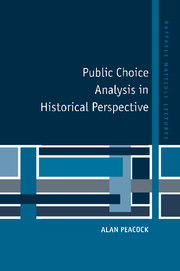Book contents
- Frontmatter
- Contents
- Preface
- PUBLIC CHOICE ANALYSIS IN HISTORICAL PERSPECTIVE
- 1 FIRST LECTURE: The Demand for Historical Perspective
- 2 SECOND LECTURE: Public Choice and the Analysis of Public Sector Growth
- 3 THIRD LECTURE: The Economic Consequences of Public Sector Growth
- 4 FOURTH LECTURE: The Calculus of Consent and Limits on Government Expenditure Growth
- 5 COMMENTARIES
- BIOGRAPHY OF ALAN PEACOCK
- Index
- RAFFAELE MATTIOLI LECTURES
3 - THIRD LECTURE: The Economic Consequences of Public Sector Growth
Published online by Cambridge University Press: 04 August 2010
- Frontmatter
- Contents
- Preface
- PUBLIC CHOICE ANALYSIS IN HISTORICAL PERSPECTIVE
- 1 FIRST LECTURE: The Demand for Historical Perspective
- 2 SECOND LECTURE: Public Choice and the Analysis of Public Sector Growth
- 3 THIRD LECTURE: The Economic Consequences of Public Sector Growth
- 4 FOURTH LECTURE: The Calculus of Consent and Limits on Government Expenditure Growth
- 5 COMMENTARIES
- BIOGRAPHY OF ALAN PEACOCK
- Index
- RAFFAELE MATTIOLI LECTURES
Summary
Introduction
The theory of public choice is characterised by a distinct view of the development of society, as it is applied to public sector growth, namely that individuals, acting alone or in combination, are rational self-interested decision-makers, which does not necessarily mean that they are not mindful of the interests of others. As we shall observe, the view taken of human nature by the Classical economists, notably Hume and Smith, who have influenced but have not always been fully understood by public choice theorists, is one of considerable subtlety.
The public-choice view of human action not only provides us with an agenda for the study of the determinants of public sector growth. It does so also for the study of the consequences of that growth. Broadly speaking, the growth which reflects human choices reinforces the tendency for individual voters/ taxpayers to form interest groups in order to use the state as a means of capturing benefits, normally at the expense of other groups. Unless powerful interest groups are able to reach agreement on bargaining rules which restrict their freedom, “group sclerosis” may result, which will be reflected in economic stagnation. This is because concern for immediate group interests directs effort towards using the state as a redistributive mechanism rather than towards improving economic performance. The “invisible hand” loses its power as the “system of natural liberty” is destroyed; the pursuit of self-interest through interest groupings does not promote but acts against the interests of all (or most).
- Type
- Chapter
- Information
- Public Choice Analysis in Historical Perspective , pp. 57 - 84Publisher: Cambridge University PressPrint publication year: 1992



